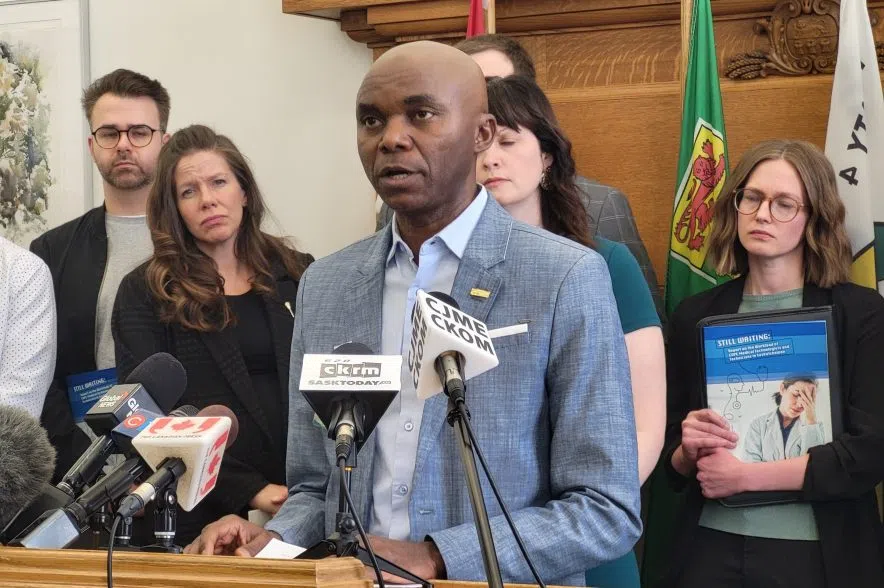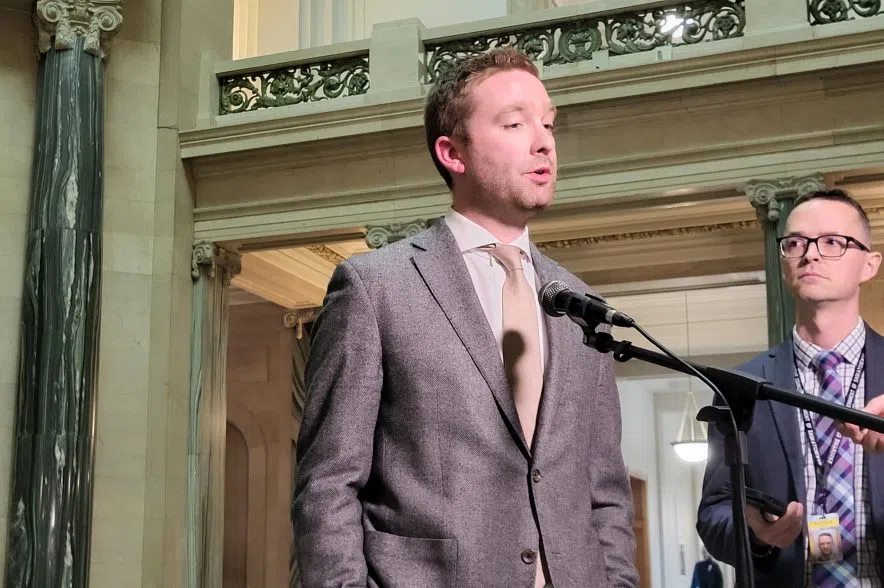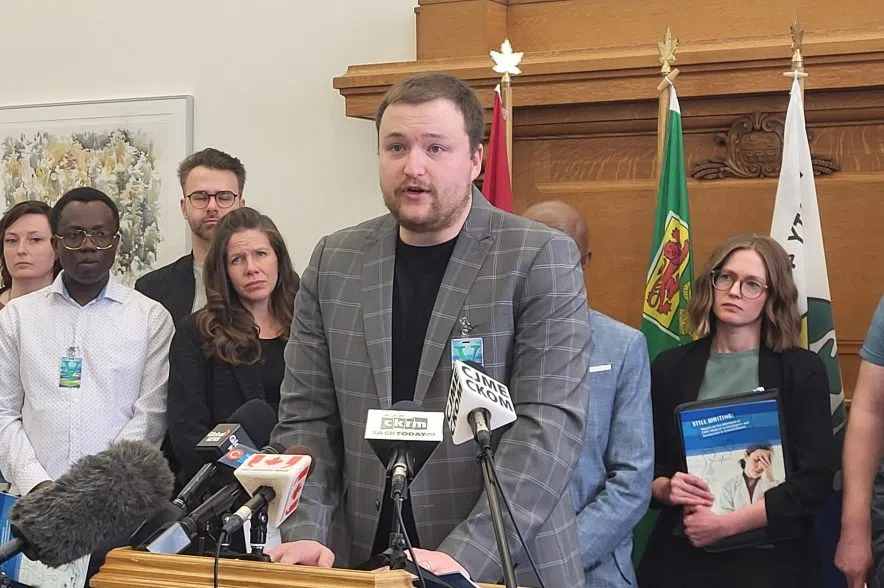After working nearly 50 hours straight, Dexter Mercer says he passed out from exhaustion while behind the wheel, causing him to crash his vehicle into a lamp post.
The medical radiation technologist at Battlefords Union Hospital said he was called back to work so frequently during that week that the longest amount of time he had between shifts was 45 minutes.
He said the incident cost him thousands of dollars in damages.
“I had already known at this point that what I was doing was dangerous, but this was kind of that final nail in the coffin,” Mercer said at an NDP media event on Monday.
Mercer said the incident led him to get a doctor’s note from his family physician prescribing a reduction in the number of shifts he could be on call for.
However, he said the note was ignored and he was made to return to his regular duties.
Read more:
- ‘Ticking time bomb’: Regina General Hospital using ‘mass casualty’ tactics
- Health-care workers ‘cautiously optimistic’ after meeting with ministers
- Staffing at Wolseley care home ‘grim,’ union president says no improvement
Years later, Mercer said the burnout caused by staffing shortages has caused him to step away from a full-time role as a technologist and only work part-time to maintain a healthy work-life balance.
According to a survey of medical technologists and technicians done by CUPE 5430, 91 per cent of respondents said that increased workload had an impact on patients and residents, with 35.3 per cent saying it had a “significant effect” on their personal health.

5430 Local president Bashir Jalloh said medical technologists and technicians provide invaluable “behind-the-scenes” work for the health-care system. (Daniel Reech/980 CJME)
‘Health care wouldn’t happen’ without medical techs
CUPE 5430 represents about 14,000 healthcare workers in the province, including technologists, Continuing Care Aides, schedulers, housekeepers and cooks.
Bashir Jalloh, Local 5430 president and nuclear medicine technologist at Pasqua Hospital, explained that technologists and technicians are an essential service for the health-care system, providing diagnostic tests and processing lab results.
He said their work is critical to diagnosing illnesses and guiding treatment decisions and that a shortage of technologists and technicians affects other areas of health care.
“All of this is connected. If we have enough staff, we can do your test quickly, you can go through your emergency quickly, you can go to your ward, you can be discharged, you can go to your long-term care facilities, or you can go home care,” he said.
“It is all connected, but for the most part, we don’t get seen. We are behind the scenes.”
The sentiment was echoed by CUPE’s Kyleigh Williams, who said workers cannot continue under these conditions. She was asked what it would look like if there weren’t any technologists or technicians.
“Health care wouldn’t happen. If there are no tests, there’s no treatment,” she said.
“People come in for care — usually because something’s wrong — and in order to get the treatment you need, we need to know what’s wrong.
“Doctors and health-care providers in general rely on diagnostic tests to make informed decisions and to give patients the best possible options for treatment.”
CUPE is asking the Saskatchewan government to hire more technologists and technicians and to better support new graduates.
It also wants the province to revise its Health Human Resources Action Plan to expand recruitment and retention incentives for current and aspiring technologists and technicians.
As well, CUPE 5430 is asking for more funding for the Saskatchewan Association of Health Organizations Inc. so that it can negotiate a new deal for its workers who have been without a contract since April 2023.
The group said technologists and technicians feel underpaid and undervalued.
The survey, published in by CUPE in a report, also found:
- 87.8 per cent of respondents reported that their workload has increased in the last five
years, an increase from the 81.7 per cent who said their workload increased when asked in
2017. - 72.4 per cent said they’ve done unpaid work to keep the system running
- 85.3 per cent said they had worked through breaks
- 91 per cent said increased workload or change in conditions had impacted staff morale (it was 79.5 per cent in the 2017 survey)

Minister of Health Jeremy Cockrill said the province takes the issues raised by medical techs very seriously. (Daniel Reech/980 CJME)
Government acknowledges difficulties
Minster of Health Jeremy Cockrill acknowledged the difficulties brought on by the vacancies but said it would take some time to solve them.
“This is exactly what we’re trying to address with our Health Human Resources Action Plan and ensure that the vacancies that are present can be filled. That’s why we’ve doubled training seats over the last couple years at the Sask Polytech program,” he said.
“We’ve added incentives … to attract those graduates and make sure they stay in Saskatchewan and specifically rural Saskatchewan.”
Cockrill also hinted at future announcement about expanding the list of communities participating in the $40,000 Saskatchewan Rural and Remote Recruitment Incentive.
He also said the province intends to reduce its reliance on the often-criticized contract nursing program meant to deal with staffing shortages, adding that contract nursing hours have been reduced by 30 per cent over the last year.
The health minister also said it was important for Local 5430 and the government to reach a deal soon at the bargaining table. The collective agreement expired on March 31, 2023.
Read more:











